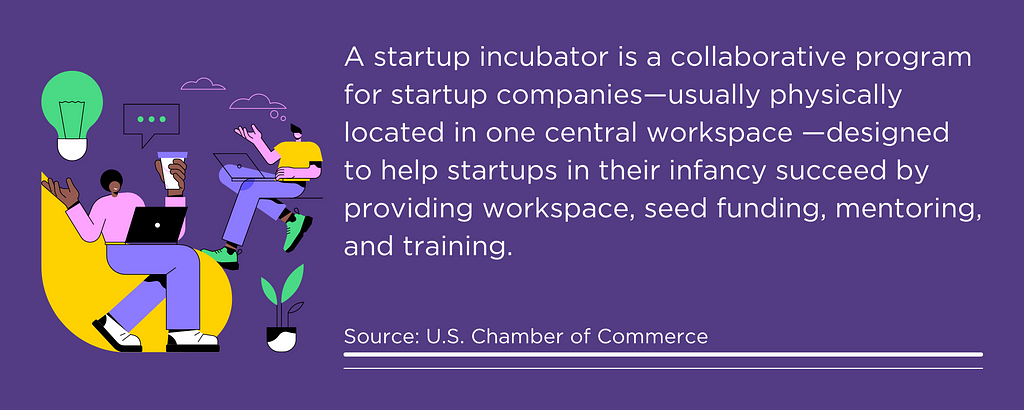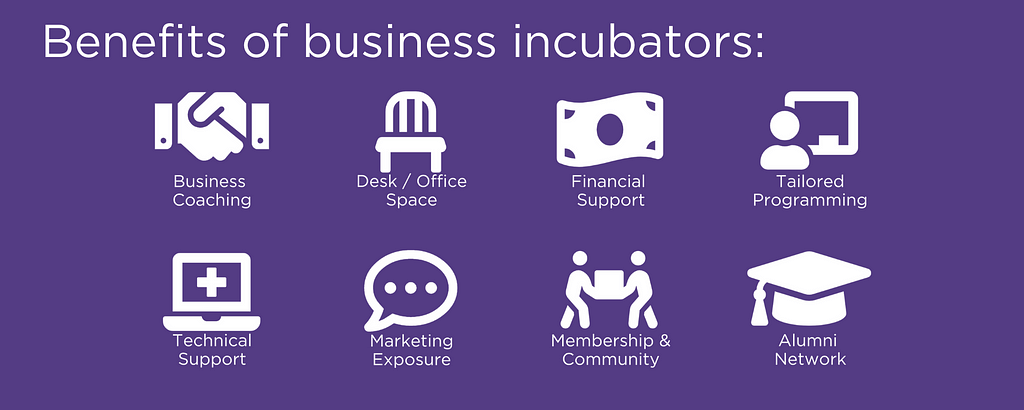Tips for determining if a business incubator is right for your startup

We throw around a lot of jargon in the entrepreneurship space. From VC and angels to pitch deck and runway, it can be challenging as an early-stage entrepreneur to understand what others are talking about. It’s almost like you could use a guide or glossary. Luckily, we’re here to help define one of those terms commonly uttered: business incubator.
This post will help you understand the common definition of a business incubator, how a business incubator differs from a business accelerator, the benefits of joining an incubator, and some tips to help you determine if a business incubator makes sense for your startup.
What is a business incubator?
Business or startup incubators are programs specially created to “incubate” early-stage startups and new ventures by providing the unique conditions & space needed to develop a business idea. By offering free or low-cost resources like desk space and mentors (see more benefits below), incubators can help entrepreneurs transform ideas into sustainable business models. Likewise — and equally important — incubators can help entrepreneurs discover that their ideas are not feasible before taking on a lot of debt or making significant personal investments.
Most incubators have a competitive application process and require a specific time commitment from participants with a set start and end date. Depending on the organization running the program, incubators can be open to all startups or geared towards specific industries, products, or types of entrepreneurs.
According to the InBIA, a global network of entrepreneurship centers, there are more than 1,400 business incubators in the United States and nearly 7,000 worldwide. Incubator programs can be sponsored by a variety of different organizations and entities, including:
- Colleges and universities
- Local, state, and federal governments
- Economic development organizations
- Nonprofit organizations
- For-profit or investment firms
- Corporations

What’s the difference between an incubator and an accelerator?
Another term tossed around just as much as business incubator is business accelerator. At their roots, both an incubator and an accelerator share the goal of wanting to help entrepreneurs build their best businesses. However, even though these two programs are similar, there are differences and shouldn’t be used interchangeably.
One of the main differences is the time commitment. In general, accelerators have shorter timelines (usually 3 months) and are designed for later-stage companies, typically those with an MVP and have completed some initial pilot testing. As the name indicates, an accelerator accelerates the growth and scaling of an already validated business idea. On the other hand, incubators typically work with entrepreneurs for 1–2 years and help them validate their business ideas.
Although not a universal rule, accelerators are more likely than incubators to invest directly into participating startups, often in return for equity.
What are the benefits of joining a business incubator?
A large financial investment isn’t always guaranteed, but the investment of free business services, coaching & mentorship, network connections, and marketing support is priceless. Here are some expected benefits:
- Business Coaching: 1-on-1 coaching & mentorship from an experienced Entrepreneur-in-Residence or other startup experts.
- Desk / Office Space: Free or subsidized workspace, often a collaborative coworking space where other members of the incubator cohort work.
- Financial Support: Direct funding through investments and grants and/or access to a network of traditional and nontraditional funding sources such as angel investors, Venture Capital firms, and loan agencies.
- Tailored Programming: Educational trainings, courses, and workshops specifically designed for early-stage startup founders and small business owners.
- Technical Support: Free or affordable access to professionals who can help with branding & marketing, getting your books in order, building apps and websites, and more.
- Marketing Exposure: Increased legitimacy and free exposure for your brand across an incubator’s network and platforms.
- Membership & Community: Acceptance into a diverse, collaborative cohort of other startup founders who you can learn and grow alongside.
- Alumni Network: Connections to a network of entrepreneurs who have been there, done that, and are ready to listen and lend a hand.

Who are business incubators looking for?
Most incubators are looking for self-starters who are serious. Serious about the program. Serious about participating in all the activities and for the entire length of the program. Serious about putting in the work. And serious about turning an idea into a full-time business.
You don’t have to have MVP or even a fully-vetted business plan, but you have to demonstrate that you’ve done your research and show that your idea is feasible and has the potential to fill a gap in the market. Even if you show up with an amazing idea, but can’t speak to the potential competition, target markets, or revenue models, then you probably aren’t ready for an incubator. You don’t have to have all the right answers, but you have to show that you’ve thought about the tough questions.
Incubators also look for entrepreneurs that are open to feedback and want to grow. That’s the whole point of an incubator!
Lastly, if you’re just trying to turn an idea into a quick side hustle for a second stream of income, then incubators probably aren’t for you. There are other programs to help with side hustles, so don’t be discouraged, but don’t apply for an incubation program if this is your end goal.
Is a business incubator program right for my business?
Each incubator is made differently, but if a program offers resources like mentors, seed funding, educational workshops, and workspace, then it’s worth a bit of your time to check it out.
Before applying, do your research. Different incubator programs have different goals and benefits. Not only do the programs focus on different stages & industries and run for various lengths of time, but most programs have values and missions that directly translate into the workshops they facilitate, the mentors they partner with, and the culture they build. Additionally, most are free, but some charge a fee or require an equity investment.
#1 Piece of Advice: If you’re unsure whether an incubator is right for you, reach out to the program! It also doesn’t hurt to speak to program alumni.
If the program checks out, then ask yourself these quick questions:
- Is the time commitment practical for me and my business?
- Considering my schedule and other responsibilities, do I have time to commit to the program?
- Am I ready to accept feedback and be challenged?
If the program aligns with your goals and you’re committed to the program, then apply!
Apply to our Incubator today!
From fledgling tech companies, healthcare innovators, and nonprofits to makers, creators, services, and shops, Ascender is for Pittsburgh’s entrepreneurs. Our Incubator is a yearlong program that helps founders launch, build, and grow self-sustaining businesses through mentorship, connectivity, space, and direct financial support.
We welcome early-stage companies with a business idea or existing solution from all backgrounds, including software, hardware, retail, technology, and social enterprises; we provide more than $20,000 in business services, plus access to up to $5,000 in direct funding.
If you’re a self-starter ready to build your best business, then learn more about our Incubator and apply!
Connect with us
Learn more about Ascender: https://ascenderpgh.com/
Sign up for our newsletter or send us a note: info@ascenderpgh.com
Follow us: Twitter — Facebook — LinkedIn — Instagram
From fledgling tech companies, healthcare innovators, and nonprofits to makers, creators, services and shops, Ascender is for Pittsburgh’s entrepreneurs. We help businesses of all types in the Pittsburgh region start and build a business through education and connectivity. See how Ascender can help you.
What is a business incubator? was originally published in Ascender on Medium, where people are continuing the conversation by highlighting and responding to this story.

